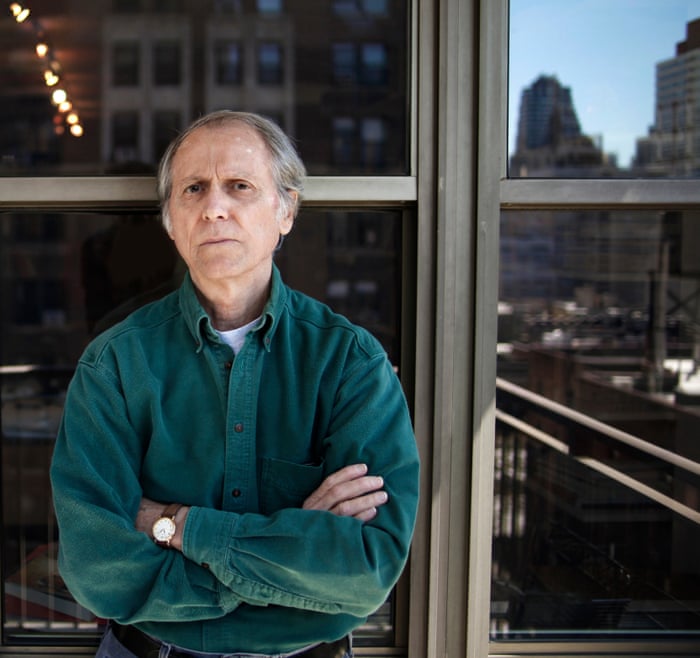
Bright, barbed … Josie Lawrence and Joe McGann in rehearsal for Love-Lies-Bleeding. Photograph: Henry C Krempels
Interview
Don DeLillo on Trump's America: 'I'm not sure the country is recoverable'
He has spent half a century dissecting America’s dreams and nightmares. Now the great novelist is imagining what his ‘deluged’ country will be like three years from today
Xan Brooks
Monday 5 November 2018
Whenever he’s able to separate himself from the distractions of daily life, from family obligations and the rolling thunder of 24-hour news, Don DeLillo taps out a few pages of his latest book. He writes out of habit and because he’s in the grip of an idea that won’t let him rest. He’s constructing a story set around the next corner, in an America he may not live to see. Obliquely, unavoidably, he’s writing about Donald Trump.
Or as he puts it: “I’m working on a piece of fiction set three years in the future. But I’m not trying to imagine the future in the usual terms. I’m trying to imagine what has been torn apart and what can be put back together, and I don’t know the answer. I hope I can arrive at an answer through writing the fiction.”
 |
| Don DeLillo in New York. Photograph: Pascal Perich |
If DeLillo can’t provide an answer, chances are no one can. The novelist has spent 50 years at the cutting edge of US culture. He’s diagnosed America’s tensions, explained its outbreaks of madness, in darkly comic profundity. Now nearing his 82nd birthday, his career has become more about the past than the future. Sometimes, this past takes the shape of old lines from Underworld or White Noise, read back to him as evidence of his prophetic gifts. At other times, it comes in a more tangible form.
Love-Lies-Bleeding is a play he wrote back in 2005 that is being revived on the London stage. It’s about Alex, a landscape artist paralysed by a stroke, and the ersatz squabbling family (son, ex-wife, new wife) who gather at the feeding tube to decide his fate. The play’s mood is contemplative but the dialogue is bright, barbed and studded with absurdist one-liners.
Speaking on the phone from New York, DeLillo says he can barely remember writing the thing. But he accepts that Love-Lies-Bleeding’s themes – the end of a life, the technological twilight – bear some similarities with his last published novel, 2016’s Zero K. “I did think that Zero K was the culmination of a certain line of inquiry,” he says. “So maybe this play was the start of all that.”
DeLillo has written several plays: Valparaiso was a spry deconstruction of celebrity culture; The Day Room a metaphysical comedy set inside a psychiatric institution. He likes the discipline involved in using a different set of tools, and the sense of release when the script meets the world.
“When I’m working on a novel,” he says, “I tend to glide from one sentence to the next. The sentences help me reveal the character. In theatre, it’s more complicated, because I don’t know who the actors are. But that’s all part of a play’s evolution.” He makes the process sound like passing on a baton. “Before anyone takes the stage, the play belongs to the playwright. In the rehearsal period, it’s the director’s play. But then, during the performance, it belongs to the actors.”
Inevitably, the journey can throw up surprises. “When Valparaiso was staged,” he says, laughing, “I kept going to see it. But on about the 10th performance, one of the actors suddenly decided to say the lines in a thick French accent. It was kind of funny. I mean, if you mess around with my sentences in a novel, you’re going to get in trouble. Whereas with a play, you have to hand it over. It finally becomes more theirs than mine.”
No doubt he’s in good hands with Nottingham-based Jack McNamara, who has directed two other DeLillo plays. McNamara tells me he has adored the author for years and claims he can always recognise a DeLillo sentence. “He sets the bar very high, in that his work is totally strange and completely everyday. Profound and screamingly funny at the exact same time. Whenever I read another so-called great American writer, the beauty of the sentence is not quite there. The humour is not as sharp, the profundity not as deep.”
Like many, McNamara first fell for DeLillo when he read the 1985 novel White Noise, that dazzling deadpan satire of toxic academia. But in recent years, he feels the author’s tone has shifted. “His novels are still steeped in the buzz of urban life, but there’s more awareness of desolate, spare space, and more questions about what comes next. How do we approach death? How do we try to control it? It’s as though his work is moving towards a final terrain.”
The evidence on the page would bear this out. Having cut his teeth as a Fifth Avenue ad man, DeLillo applied his copywriting skills to the nation as a whole. He was America’s weathervane, its Geiger counter, mapping the landscape in pin-sharp prose. In Libra, he tackled the Kennedy assassination, the conflation of celebrity and terrorism in Mao II, and the deflating dotcom bubble in Cosmopolis.
Since the doorstop bestseller Underworld, in 1998, his books have turned shorter, quieter, more teasingly inconclusive. The older he grows, the less narrative sense the world makes. Trump sits in the White House, there are pipe bombs in the post and Russian trolls are targeting the swing states. We may have reached the point when the facts outstrip the fictions.
“Oh, I think whatever’s going on now seems unique,” he says. “The question is whether the situation is terminal. I’m very reluctant to talk about Trump, simply because everybody else is. We’re deluged with information about Trump on every level – as a man, as a politician. But what’s significant to me is that all of his enormous mistakes and misstatements disappear within 24 hours. The national memory lasts 48 hours, at best. And there’s always something else coming at us down the pipeline. You can’t separate it all out. You get lost in the deluge.”
So what’s the prognosis? DeLillo, God help us, is as discombobulated as anyone. “It’s hard to know. I think it would take a great shift of events for the country to restore its balance, to restore its consciousness, and to think about things the way we did during the Obama administration.” He sighs. “Right now, I’m not sure the situation is recoverable.”
When he can no longer stomach the news, he visits the movies with his wife, Barbara Bennett, a former banker turned landscape designer. DeLillo – no surprise – has always loved cinema. He came of age on a diet of European arthouse (one catches glimmers of Antonioni and Godard in his playful, sculpted fiction). He once laid on a screening and talk about the Zapruder film that captured JFK’s assassination. Last month, he binge-watched five pictures at the New York film festival. Trouble is, he’s already forgotten the names. Mind like a sieve – it’s a hazard of his age. Another laugh. “I have to think hard to even remember my own work.”
I’m trying to recall what just screened in New York. Did he catch Alfonso Cuarón’s Roma? “No!” he says, stirred. “We couldn’t get in. But we saw a Polish film that was very good.”
Paweł Pawlikowski’s Cold War, about tragic lovers strung across the the iron curtain? “Yes, that’s right,” he says. “It was very good. And beautifully filmed in black and white. I’m all in favour of black and white. It’s funny, I recently rewatched Children of Men.” That’s another Cuarón film, about a society on the verge of collapse after decades of human infertility. “I was very disappointed because I had remembered it in black and-white, and it wasn’t. I had misremembered the film the way I wanted it to be. I mean, it’s a strong piece of work either way, but it would be stronger if it had been in black and white.”
I’m trying to recall what just screened in New York. Did he catch Alfonso Cuarón’s Roma? “No!” he says, stirred. “We couldn’t get in. But we saw a Polish film that was very good.”
Paweł Pawlikowski’s Cold War, about tragic lovers strung across the the iron curtain? “Yes, that’s right,” he says. “It was very good. And beautifully filmed in black and white. I’m all in favour of black and white. It’s funny, I recently rewatched Children of Men.” That’s another Cuarón film, about a society on the verge of collapse after decades of human infertility. “I was very disappointed because I had remembered it in black and-white, and it wasn’t. I had misremembered the film the way I wanted it to be. I mean, it’s a strong piece of work either way, but it would be stronger if it had been in black and white.”
A few weeks ago, DeLillo attended the memorial service for Philip Roth at the New York Public Library. Roth, who died in May, was his sometime friend and one-time rival for the vexed and probably illusory title of Greatest Living American Writer. But the thing about Roth is that his death came at the end of a lengthy self-imposed retirement. The man spent his last eight years kicking about his apartment, periodically commenting on US politics and contentedly reading non-fiction. By all accounts, he did not miss writing one bit.
“That’s true,” says DeLillo. “I don’t think he did.” Retirement, he thought, wouldn’t suit him the same way. “Everybody is different and there are always distractions. But I feel I have an idea in my mind I need to work on. And when I’m able to sit down and put my fingers on the typewriter, things are moving along pretty well. These days I’m much slower. I can’t work at the same pace. But what the hell, I’ll keep going. It’s what’s keeping me alive.”


No comments:
Post a Comment